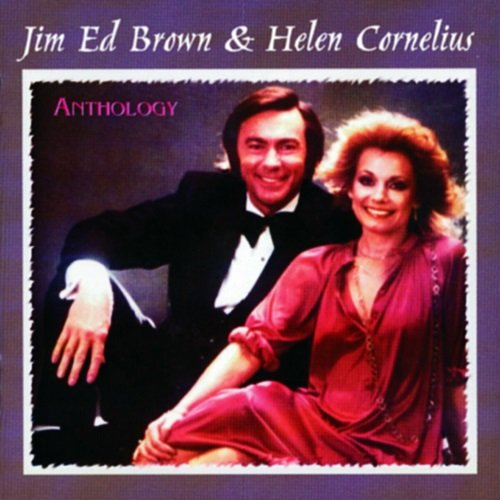Jim Ed Brown:
Jim Ed Brown came to fame as a member of the '50s vocal group the Browns, where he was the band's lead male vocalist. In 1965, when the group was still together, he embarked on a solo career that would eventually eclipse the success of the Browns.
Brown and his older sister, Maxine, began performing while he was still in high school. In 1954, the duo signed a contract with Fabor, releasing five singles on the label. Later that year, their sister Bonnie joined the duo and they became the Browns. From 1956 until 1967, the Browns were signed to RCA Records, where they had a number of moderately successful hit singles, highlighted by the 1959 number one "The Three Bells."
Brown began his solo career in 1965, two years before the Browns disbanded. Initially, he didn't have much success and just scraped the bottom of the country Top 40. Once the Browns disbanded, Brown began to have more substantial hits, beginning with the number 18 single "You Can Have Her," which was a cover of the Roy Hamilton hit. That was followed by the beer-drinking anthem "Pop a Top," which climbed to number three. Although his next single, "Bottle, Bottle," reached number 13, Brown didn't have any major hits for the rest of the '60s.
As his chart performance stagnated in 1968, he formed a backing group called the Gems and began a residency at the Sahara Tahoe's Juniper Lounge. In 1969, he hosted the syndicated television show The Country Place, which ran until 1970.
As The Country Place was ending its run, Brown had his first major hit since "Pop a Top" with the number four single "Morning." Again, he wasn't able to immediately follow "Morning" with another Top Ten hit, but he began charting more frequently. In 1973, he had two Top Ten hits, "Southern Loving" and "Sometime Sunshine," which were followed by the Top Ten "It's That Time of Night" in early 1974.
Jim Ed Brown had his greatest success in the late '70s, when he regularly performed duets with Helen Cornelius. They had six Top Ten hits between 1976 and 1980, including their debut single, "I Don't Want to Have to Marry You," which went to number one in 1976. During this time, he had some solo hits, but only two of them broke the Top 40. Brown and Cornelius ended their partnership in 1981, following the number 13 hit "Don't Bother to Knock."
After the breakup of his duo with Helen Cornelius, Jim Ed Brown pretty much retired from recording. He made the occasional appearance on The Grand Ole Opry and he sometimes reunited with Cornelius. Brown also hosted TV game shows and talent contests throughout the '80s. Toward the end of the decade, he opened the Jim Ed Brown Theater near Opryland in Nashville, Tennessee, where he performed regularly for a number of years. He died of cancer on June 11, 2015 at the age of 81.
Helen Cornelius:
Helen Cornelius was known to country music fans as a singer/songwriter, but she also danced, acted, and played several instruments. She was born Helen Lorene Johnson in Monroe City, MO, and grew up on a farm with older brothers who played in bands. She and her sisters Judy and Sharon formed a trio, and their supportive father took the girls to their gigs. Eventually Cornelius left her sisters and began touring with her backup band, the Crossroads.
After graduating from high school, Cornelius married and worked as a secretary. She returned to touring during the '60s and became a songwriter, gaining recognition in 1970 when she was signed as a writer to Columbia/Screen Gems Music after submitting a demo tape. After the company folded, Cornelius sent a tape to Jerry Crutchfield and began working for MCA Music; he later helped her sign with Columbia Records. In 1973, she came to Nashville and recorded two unsuccessful singles, later signing to RCA. She released her first single for the label in 1975; neither it nor its follow-up charted.
The key to success proved to be Ferguson's pairing of Cornelius with Jim Ed Brown. The duo debuted in 1976 with "I Don't Want to Have to Marry You," which soon became a major hit. She again tried a solo single, "There's Always a Goodbye," but it did nothing. She had no other hits until her duet with Brown on "Saying Hello, Saying I Love You, Saying Goodbye" became a Top Three success. Later in 1976, the two began appearing regularly on the TV series Nashville on the Road. Cornelius went out on tour with Brown's road show and also made her debut on the Grand Ole Opry.
In 1978, she and Brown had more chart success with two Top 15 duet singles, "I'll Never Be Free" and "If the World Ran Out of Love Tonight," and Cornelius scored a solo hit with "What Cha Doin' After Midnight Baby." The Cornelius/Brown hit streak continued until 1981, when Cornelius, feeling as though she was losing her identity as a performer, decided to break up the duo. She then released "Love Never Comes Easy," which made it to the Top 50. Her next hit came in 1983, the year she also worked as a spokesperson for the Cystic Fibrosis Foundation. In 1984, Cornelius changed directions and joined the road revival of Annie Get Your Gun, also touring with the Statler Brothers. She released a self-titled album in 1985, and three years later, she joined Brown for the Reunited Tour '88.
The 1990s saw the grand opening of Helen Cornelius' Nashville South, located in the thick of Gatlinburg, TN, a thriving entertainment district. The facility featured live country entertainment by Cornelius and her band nightly, and saddles for stools in the cocktail lounge. 2002 and 2003 found Cornelius performing at the Jim Stafford theater in Branson, MO, as a rotating part of the women-in-country entertainment production Us Girls!.




